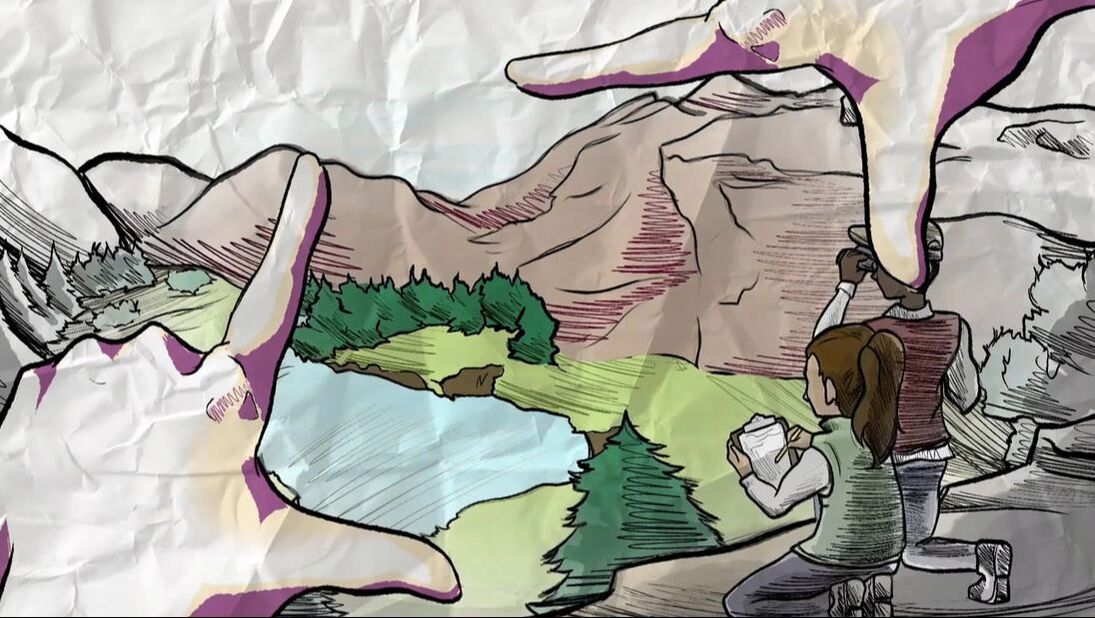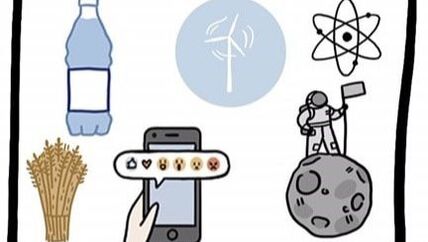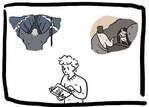 I love to spend time outdoors. That is a good thing because I am a field biologist who has structured my life and career around opportunities to be in the woods. You won’t be surprised to hear that I rarely find myself alone outside. Virtually all humans feel connected with living things and beautiful spaces. We vacation in the outdoors, we seek fresh air and peaceful spaces for our mental and physical well-being, we spend tremendous sums of money to live with a view of nature or we decorate to mimic that ideal - and I bet your computer wallpaper depicts something from nature. E. O. Wilson, the renowned Harvard biologist, noticed the human connection with nature and other living things and labeled it “Biophilia.” Now consider the most Biophilic people in your life or society; the environmental advocates, the outdoor enthusiasts, the avid gardeners and birdwatchers, the biologists? Are they Christians? While some undoubtedly are, most probably are not. Studies show that scientists are less likely than the average person to be Christian and some argue that environmentalism is quasi-religious for secular humanists. If true, we should question why many of those who are most connected to God’s creation, are least connected to God? This can be partially explained by the emergence, over the past few centuries, of a modernized Gnosticism in which the physical world is seen as evil and only the spiritual world is part of God’s eternal plan. Due in part to this view, many in the secular world have the false impression that Christianity has no interest in the physical world and thus nothing to offer those who feel connected to it. For example, in 1843 religious critic Ludwig Feuerbach said, “Nature, the world, has no value, no interest for Christians. The Christian thinks only of himself and the salvation of his soul.” More recently, historian Roderick Nash complained that “Christian aspirations were fixed on heaven, their final resting. The earth was no mother but a kind of half-way house of trial and testing from which one was released at death. Christians expected that the earth would not be around for long. A vengeful God would destroy it and all unredeemed nature with floods or drought or fire.” While this caricature bears little resemblance to orthodox Christianity, its persistence speaks volumes about our failure to teach Christians and non-Christians about the doctrine of creation and the theology of nature. Further, it explains why so many of those who tread in environmental and outdoorsy circles think that Christianity has nothing to explain their compulsion to care for, and their emotional connection with, their physical surroundings. In reality, orthodox Christianity speaks volumes about our connection with the physical world. In the first chapter of Romans, Paul offers an interpretive framework that connects humans to God through what has been created. Our biophilia also fits with the Christian doctrines of God’s providence and immanence. Perhaps our fascination emerges from a subconscious experience of God’s peace and glory through nature as it is sustained by Jesus from one moment to the next. Further, history reveals a long list of influential thinkers, from Francis of Assisi and John Calvin to Jonathan Edwards and John Stott, not to mention numerous scientists, who wrote of their connection with God through nature. Despite this rich tradition and our expansive theology of nature, our path to reaching the world’s biophiles isn’t simple or straight. The enlightenment’s stunting of our theological imaginations still haunts many western Christians, not to mention the tensions between science and faith, the politicization of the environment, and the popularity of certain gnostic views of eschatology. The good news is that none of these explanations should prevent us from assigning theological meaning to our emotional connection with nature. It would help us reach the millions around the world who fear that a Christian faith means they must cleave from their interest in science or nature. Perhaps the most fruitful step forward will come with a realization that the proper interface of Christianity and science is not to reinterpret scientific explanations, but to learn to see the understandings from science as the details of how all creation praises and glorifies the living God.
2 Comments
 If there has ever been a time to seek God in nature, this is it. The coronavirus pandemic has shut down churches, cancelled small groups and put an indefinite pause on our physically social experience of worship. While group gatherings should not be our sole connection to our faith, the Kingdom of God is an inherently social project and many of us crave conversation and fellowship in our pursuit of Jesus. As we scramble to learn online meeting platforms and adapt our worship strategies to a digital interface, many of us yearn for something more. The simultaneity of social distancing measures with the annual emergence from our winter retreat (in the northern hemisphere at least) have made ventures into the outdoors a critical respite from our under-roof existence. My suburban Minnesota corner lot needs supplementary signage to direct the stream of walkers and cyclists occupying the road. Can we turn these fresh air-seeking excursions into a spiritual discipline to fill in the gaps on our currently disrupted journey of faith? If you are apprehensive, it may be derived from the sense of novelty in seeking God anywhere but in Scripture. In my years in youth group, church camps and even in adulthood, I don't recall any church leader encouraging me to look for God in God's creation. When I discuss this subject with my thoroughly-churched university students I get quizzical responses: Are Christians allowed to do that? What about tradition? What about the forefathers? What about sola scriptura? Well, it depends on which tradition you emphasize. The authors of Scripture tell us that creation reveals the glory, eternal power and divine nature of God. Prior to the printing press and the Protestant Reformation, Christians did regularly commune with God through the natural world. The pre-Reformation English church integrated the natural and sacred through their understanding of the seasons of the year, fruitfulness of the land and natural history of familiar species. As far back as the 13th century we see references to knowing God through the two books of revelation, the book of God’s Word and the book of God’s Works. It wasn't until after the Reformation and the common availability of Bibles that Protestantism dismissed the symbology tied to the natural world. Recognizing this history, we can follow the ancient church into a theology of nature from centuries ago. And what about Jesus? We can follow His example. To calm our anxious tendencies, Jesus told us to reflect on the birds and the flowers and to seek His kingdom first (Matthew 6:25-34). Jesus' disciples noticed his pattern of stepping away from the crowds to retreat to the wilderness to pray (Luke 5:16). We aren't told if He wanted solitude or time in nature, but I've always assumed it was both. Perhaps He had a divine notion of what abundant data now support, that time in natural settings is good for our mental and physical health. We have yet to determine the precise mechanisms but the relationships appear to be genuine. As the medical and mental health communities prescribe novel treatments, someone ought to commission a similar study on our spiritual health. As a scientist, I hypothesize that time in the outdoors would leave us with a renewed sense of the divine and reverence for God. Further support comes from rereading the end of Job, Psalm 104, Psalm 19, Matthew 6, Romans 1, Romans 8 or any number of other passages that reveal God's delight in His creation, the mysteries of God's presence in every aspect of nature or how all of it will be renewed with us when Jesus returns. Better yet, bring your Bible with you and enjoy the weather and fresh air as you read through those verses in the outdoors. Pray and meditate over them as you iterate Lecto divina style and be reminded that Scripture invites us to contemplate the wonders of creation as we consider the ways of God. While most of us eagerly anticipate the return to “normalcy” and resumption of our social experience of faith, forays into nature can and should develop into more than stretching our legs. This isn’t to diminish scripture as a revelation of God but to diversify our faith journey to experience all of God’s revelation. God is in all things and all life is animated by the same spirit that fills us. If you have ears to hear and eyes to see, turn them to the wooded edge, the crashing waves and the melodies that pour from the tree tops. Until we can return to our favored pews and small group meetings, time in nature can help fill the gaps in our spiritual lives. There are always birds. The trees are reliable. You can commune with them whenever you are ready. You may discover a pathway to God that remains when the social distancing policies no longer dictate your spiritual life.  Credit: Belle Pappenfus Credit: Belle Pappenfus We credit science with numerous accomplishments that have stimulated our imaginations and improved our lives. We have reduced hunger and disease, harnessed energy, and purified water. We have landed on the moon and put personal computers in the palms of our hands. With science, we have a clearer understanding of how the world works and we eagerly anticipate the next discovery and innovation. While the growth of science is credited with so much good, we might also ask if any undesirable consequences have emerged. For example, has that computer in the palm of your hand improved your life? The jury is out. However, there are also potential consequences that are far more subtle. One of these is related to how we think about the natural things we are studying. Has science, in successfully providing explanations for how the world works, caused a diminished view of God? If so, why? Can our approach to the natural world put God in the center of creation?  Credit: Belle Pappenfus Credit: Belle Pappenfus Part of this problem is tied to our perception of how God acts. The Bible is filled with reports of spectacular and memorable miracles. The dead are resurrected, the Red Sea is parted, and water is turned into wine. Some people encounter these accounts and dismiss them since no scientific explanation can be identified; others embrace them as examples of God’s power and glory on full display. If you hold that view, it could lead to a subconscious assumption that all of God's actions appear as miracles, but that view is setting you up for all kinds of trouble. A pre-modern mindset was quick to credit God and other metaphysical beings for actions and observations for which we now have scientific explanations. For example, many viewed illness as a test of faith, a punishment for sin or an opportunity for spiritual purification. Weather patterns, growth of crops, and the movement of planets and stars among many other processes, were all attributed to the supernatural. God (or gods) were given credit and blame for much of what happened to those living in the pre-modern world. The Scientific Revolution of the 16th and 17th centuries initiated a transformation of western society's views of nature by providing plausible and verifiable explanations for these and numerous other phenomena. When God and God’s agents appeared to lose their jobs in nature, a new mindset arose that left no action for God or the belief that there is no God at all. Dietrich Bonhoeffer, renowned German theologian, warned us of this problem:  Credit: Belle Pappenfus Credit: Belle Pappenfus "How wrong it is to use God as a stop-gap for the incompleteness of our knowledge. If in fact the frontiers of knowledge are being pushed further and further back (and that is bound to be the case), then God is being pushed back with them, and is therefore continually in retreat. We are to find God in what we know, not in what we don’t know." Therefore, a belief that God is active in the unknown but absent, or even just silent, in what we can describe may train you to think that God plays no active role in your day-to-day life or in the larger world. This could create a mental chasm between you and God. The second unintended consequence of a wholesale devotion to science is related to our source of hope for the world. We should be impressed by the leaps in human well-being made in the past few centuries. We no longer fear certain diagnoses or a season with little rain; we have medication and irrigation to address those problems. There is hope for a future in which all energy production will be renewable and pollution-free. Harvard Psychologist Steven Pinker’s recent book, Enlightenment Now, emphasizes the progress made by humans through science and reason, and implies that we can expect it to continue. If you share his faith in humanity and our ability to independently solve problems, then what need is there to follow Jesus? Christian doctrine holds that humanity, without direction from a divine compass, will devolve into our sinful nature and fail to reach the heights of which we are capable and ultimately create more problems, not fewer. And yet modern atheism often touts the capability of humans to solve our problems without the need of a God. That idea does not come from science, it comes from a worldview that sees humans as sole rulers of the earth. God’s creation is good and we should use science to produce knowledge of its constituent parts, the mechanisms that make it go, and the story of how it gained its current form. However, we should exercise caution to ensure that scientific reason doesn’t convince us that God is not present or active in those parts and mechanisms or that we can rely on our own abilities to save the world from suffering. The good news is that it doesn’t have to. Integrating science and Christian faith can inspire a fuller knowledge of God and draw us closer to Jesus. For this to happen, we need to reconsider the way we think and talk about how God acts so that we create Christian communities that are scientifically literate and have a sense of a divine presence in the systems and entities created by and for God.  YouTube didn’t exist when I was in college. Whoa! Times have changed. Throughout the past decade, free videos from independent creators have gone from virtually nonexistent to being indispensable for education and entertainment. Dozens of educational channels, some supported by the National Science Foundation and PBS, have legitimized YouTube as a critical and respected source for both teachers and students. Christians have joined the cause with similar success effectively engaging a worldwide audience with content on the Bible, philosophy, theology and ministry. At this point, it is hard to conceive of a topic that isn’t covered by multiple channels. However, I believe there is at least one notable absence. We lack a thoughtful presentation of the libraries worth of information published on the intersection of science and theology. It isn’t for lack of interest. An Amazon search for books exploring the relationship between science and Christianity produces over two thousand results. It also isn’t for lack of importance. The perception of incompatibility between science and theology is still used as a reason to doubt the relevance of the Bible and the existence of God causing some to walk away from their faith. While the tension is real, scholars in the history and philosophy of science generally agree that there isn’t true conflict between science and faith. However, the public perception of conflict tells us that a sense of science and theology being complementary has not made it into our social consciousness. Fortunately, thinkers and worshipers have been contemplating this relationship for millennia and have built compelling explanations for how to understand God in the context of the study of creation. One of the primary goals of Disciple Science is to share their vision, and ours, of the contributions each field of study (science and theology) can contribute to a fuller picture of reality. If you doubt that this is possible, then we invite you to watch, listen and engage with questions of your own. We aren’t prone to dogma, hurling insults or “destroying” another view, instead we welcome questions and feedback from anyone who wants to approach these topics in a respectful manner. We won’t guarantee simple answers to every question, but we do hope to create an environment in which everyone feels safe to ask. You can have a deep faith while pursuing a career or hobby in science, and we believe that science can inspire a strengthened Christian faith. |
AuthorDale Gentry Archives
June 2021
Categories |
Connect with us
|
|
Career and Collaborate
Job Openings (coming soon) |

 RSS Feed
RSS Feed